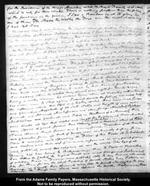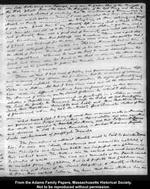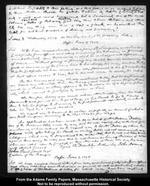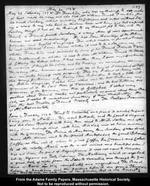May 30. Saturday 1778.
Dr. Franklin, who had no Business to do, or who at least would do none, and who had Mr. William Temple Franklin for his private Secretary, without consulting his Colleagues and indeed without saying a Word to me, who lived in the same house with him and had no private Secretary, though I had all the Business to do, thought fit to take into the Family a French private Secretary, a young Man of civil deportment however and good Understanding. He had some Knowledge of the Italian, German and English Languages. For what reason or for what Purpose he was introduced I never knew. Whether it was to be a Spy upon me, or whether Franklin was persuaded by some of his French Friends to give him Employment, or whether it was to save Mr. William Temple the trouble of Copying the Letters when I had written them, I gave myself no trouble to enquire. I thought his Salary and his Keeping an unnecessary expence. The young Man however continued with Us, as long as I remained at Passi, and conducted himself with propriety. This day I dined at home, with this young Gentleman only. Having some Inclination to look a little into the Italian Language, I asked him which was the best Dictionary and Grammar of it. He said those of Veneroni: and the best Dictionary and Grammar of the German, were those of Gottshed. I asked many questions about French books, and particularly enquired about their Prosody, as I wished to understand something of their Versification. He said the best Treatise of French Prosody was The Poetique Francoise of Mr. Marmontell.
June 2. Tuesday. 1778.
Went to Versailles, and found it deserted, the Court being gone to Marli.... We went to Marli, met the Count de Vergennes and did some Business with him, then went to Mr. De Sartine and after doing some business dined with him. His Lady was at home and dined with the Company. The Prince de Monbarry
[Montbarey], then Secretary of War, dined there. After dinner went to the Spanish Ambassadors, the Count D'Aranda's
Caffee, as they call it, where he gives Coffee, Ice Creams and Cakes to all the World.Marli was the most curious and beautiful place I had yet seen. In point of Magnificence it was not equal to Versailles but in Elegance and Taste,
superiour. The Machinery, which conveys such a great body of Water from the Seine to Versailles, and through the Gardens of Marli
[illegible] is very complicated, and magnificent. The Royal Palace is handsome and the Gardens before it are grand. There are six Pavillions, on each side of the Garden, that is six Houses
Page 2
for the Residence of the Kings Ministers, while the Royal Family is at Marli, which is only for three Weeks. There is nothing prettier than the play of the fountains in the Garden. I saw a Rainbow in all its glory in one of them. The Shades, the Walks, the Trees were the most charming I had yet seen.
We had not time to visit Lucienne [Louvecienne], the elegant retreat for devotion, Penitence and Mortification of Madam Dubarry: and indeed I had been in such a Reverie in the morning in passing Bellvue, that I was not averse to postpone the Sight of another Object of the same kind to a future Opportunity.
On the Road from Paris and from Passi to Versailles, beyond the River Seine and not far from St. Cleod
[Cloud] but on the opposite side of the Way, stood a
pallace of uncommon beauty in its Architecture, situated on one of the finest Elevations in the
neighbourhood of the River, commanding a Prospect as rich and variegated as it
is was vast and sublime. For a few of the first times that I went to Versailles I had other Things to occupy my Attention: but after I had passed through my Ceremonies and began to feel myself more at Ease, I asked some Questions about this place and was informed that it was called Bellevue and was the Residence of the Kings Aunts Adelaide and
[Victoire], two of the surviving Daughters of Louis the fifteenth. That this palace had been built and this Establishment made by that Monarch for Madame Pompadour, whom he visited here, almost every night for twenty Years, leaving a worthy Woman his virtuous Queen alone at Versailles, with whom he had sworn never to sleep again. I cannot describe the feelings, nor relate half the reflexions which this object and history excited. Here were made judges and Councillors, Magistrates of all Sorts, Nobles and Knights of every order, Generals and Admirals, Ambassadors and other foreign Ministers, Bishops, Archbishops,
and Cardinals and Popes, in the Arms of a Strumpet. Here were directed all Eyes that wished and sought for Employment, Promotion and every Species of Court
favour. Here Voltaire
and Richelieu and a thousand others of their Stamp, obtained Royal
favour and Commissions. Travellers of all Ranks and Characters from all Parts of Europe, were continually passing from Paris to Versailles and spreading the Fame of this House, its Inhabitants and Visitors and their Commerce, infamous in every point of view, civil, political, moral and religious, all over the World. The Eyes of all France had been turned to Bellevue, more than to Paris or Versailles. Here Letters de Cachet, the highest Trust and most dangerous Instrument of arbitrary Power in France were publickly sold, to any Persons who would pay for them, for any the vilest Purposes of private Malice, Envy, jealousy or Revenge or Cruelty. Here Licences were sold to private Smugglers to contravene the Kings own Laws, and defraud the public
Revennue. Here
Page 3
were sold Dukedoms and Peerages, and even the Cordon blue of the Knights of the Holy Ghost. Here still lived the Daughters of the last King and the Aunts of the present. Instead of wondering that the Licentiousness of Women was so common and so public in France, I was astonished that there should be any Modesty or Purity remaining in the Kingdom, as there certainly was, though it was rare. Could there be any Morality left among such a People where such Examples were set up to the View of the whole Nation? Yes there was a Sort of Morality, there was a great deal of humanity, and what appeared to me real benevolence. Even their politeness was benevolence. There was a great deal of Charity and tenderness for the poor. There were many other qualities that I could not distinguish from Virtues.... This very
Monarck had in him the Milk of human Kindness, and with all his open undisguised Vices was very superstitious. Whenever he met the Host, he would descend from his Coach and
[ [fall]?] down upon his Knees in the Dust or even in the Mud and compell all his Courtiers to follow his Example. Such are the Inconsistencies in the human Character.
From all that I had read of History and Government, of human Life and manners, I had drawn this Conclusion, that the manners of Women were the most infallible Barometer, to ascertain the degree of Morality and Virtue in a Nation. All that I have since read and all the observations I have made in different Nations, have confirmed me in this opinion. The Manners of Women, are the surest Criterion by which to determine whether a Republican Government is practicable, in a Nation or not. The Jews, the Greeks, the Romans, the Swiss, the Dutch, all lost their public Spirit, their Republican Principles and habits, and their Republican Forms of Government, when they lost the Modesty and Domestic Virtues of their Women.
What havock said I to myself, would these manners make in America? Our Governors, our judges, our Senators, or Representatives and even our Ministers would be appointed by Harlots for Money, and their judgments, Decrees and decisions be sold to repay themselves, or perhaps to procure [illegible] the smiles and Embraces of profligate Females.
The foundations of national Morality must be laid in private Families. In vain are Schools,
Accademies and universities instituted, if loose Principles and licentious habits are impressed upon Children in their earliest years. The Mothers are the earliest and most important Instructors of youth.... The Vices and Examples of the Parents cannot be concealed from the Children. How is it possible that Children can have any just Sense of the sacred Obligations of Morality or Religion if, from their earliest Infancy, they learn that their Mothers live in
Page 4
habitual Infidelity to their fathers, and their fathers in as constant Infidelity to their Mothers. Besides the Catholic Doctrine is, that the Contract
of marriage is not only a civil and moral Engagement, but a Sacrament, one of the most solemn
Vows andOaths of Religious
devotion. Can they then believe Religion and Morality too any thing more than a Veil, a Cloak, an hypocritical Pretext, for political purposes of decency and Conveniency?
June 3. Wednesday. 1778.
On this Day We sent the following Letters.
Passi June 3. 1778
Sir
We have received sundry Letters from Lt. Simpson, and sundry Certificates from Officers and others, concerning his Behaviour in General, and particularly upon that Occasion, in which he is charged with disobedience of Orders.... Without giving or forming any decided Opinion concerning his guilt or innocence of the Crime laid to his charge, We may venture to say that the Certificates We have received are very favourable to his Character, and at least afford reason to hope, that he did not mean to disobey his orders.
Be this however, as it may, We are constrained to say, that his confinement on board any other Ship than the Ranger, and much more his Confinement in a Prison on Shore, appears to Us to carry in it, a degree of Severity, which cannot be justified by reason or Law.
We therefore, desire, you would release Mr. Simpson, from his imprisonment, and permit him to go at large, on his Parole to go to Nantes, there to take his passage to America, by the first favourable Opportunity, in order to take his Tryal by a Court Marshall.
We request you to transmit Us, as soon as possible, an Account of what is due to Lt. Simpson, according to the Ships Books for Wages.
An Application has been made to Us, in behalf of Mr. Andrew Fallen, one of the Prisoners lately made by you, and his case represented, with such Circumstances, as have induced Us to request you, to let Mr. Fallen go, where he [illegible] will, after taking his Parole in Writing, that he will not communicate any intelligence which may be prejudicial to the United States, that he will not take Arms against them during the War, and that he will surrender himself Prisoner of War whenever called upon by Congress, or their Ministers at Paris. We are, Sir, your most obedient Servants. Signed B. Franklin, Arthur Lee, John Adams.
John Paul Jones Esqr. Captain of the Ranger.
Passi June 3. 1778
Sir
We have received several Letters from you, and several Certificates from Officers and others, respecting your Behaviour in general, as well as particularly relative to the Charge of Disobedience of orders, for which you have been confined.




